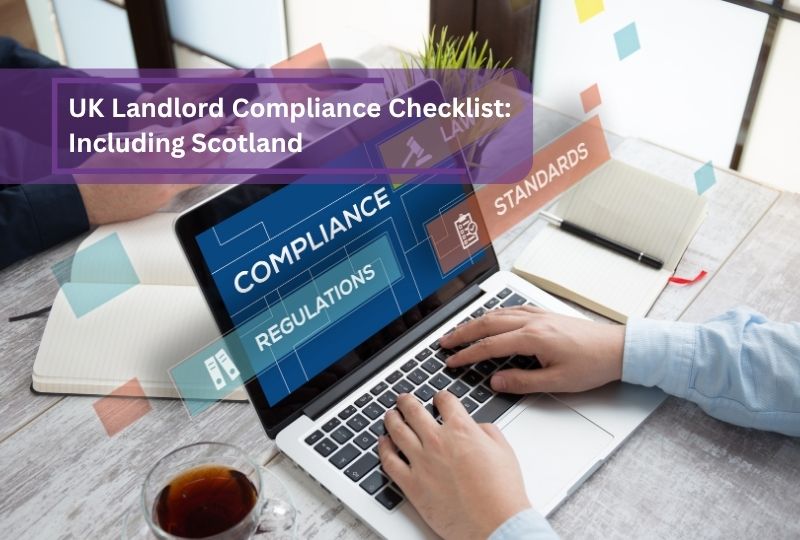As a landlord, ensuring your property complies with local, state, and federal laws is essential to protect your investment and avoid costly legal issues. The landscape of landlord regulations can be overwhelming, but a comprehensive compliance checklist can help you stay organized and legally sound.
Compliance is about more than just meeting legal requirements—it’s about protecting your tenants and your property. Whether you’re a seasoned landlord or just starting out, this guide covers a comprehensive landlord compliance checklist to help you cover essential obligations, including specific regulations for the UK and Scotland, so you can manage your property confidently and avoid common pitfalls.
What Is Landlord Compliance
Landlord compliance refers to adhering to all legal requirements and regulations that govern rental properties. This includes maintaining safety standards, ensuring the property meets legal obligations, and promoting a secure living environment for tenants. Staying compliant protects tenants and helps landlords manage their investments more effectively and sustainably. It helps landlords avoid fines, legal issues, and potential lawsuits while safeguarding their reputation and property investment.
Why Compliance Matters: “How to Rent” Guide for Landlords
Renting out your property in the UK requires more than just setting up a rental agreement—it involves compliance with important legal requirements, and one of the key documents in this process is the “How to Rent” guide. While the “How to Rent” guide applies in England, Scottish landlords are required to provide a Tenant Information Pack. This pack outlines key details about the tenancy, property, and the rights and responsibilities of both parties. It ensures tenants are informed about legal rights, property maintenance, and how disputes are handled.
Failing to provide this pack can lead to legal complications, particularly if you need to regain possession of the property. Staying compliant protects your rights and helps maintain a smooth, professional landlord-tenant relationship.
Landlord Compliance Checklist: Key Legal Requirements for Scotland

Before we explore the Scotland-specific rules, it’s essential to understand the fundamental obligations of landlords across the UK. These laws are in place to keep tenants safe, safeguard landlord rights, and ensure that properties meet high standards. Although many of these regulations are consistent across the UK, getting familiar with a landlord checklist for renting a house is a great first step in staying compliant and avoiding any issues or penalties:
1. Landlord Registration with the Local Council
Before you let out a property in Scotland, you must register as a landlord with the local council where the property is located.
- Registration is mandatory under the Antisocial Behaviour etc. (Scotland) Act 2004.
- Registration must be renewed every 3 years.
- Letting a property without registering is a criminal offence and may result in serious penalties.
2. Property Safety Standards
Rental properties must meet minimum safety and habitability standards. In Scotland, this includes compliance with the Repairing Standard and the Tolerable Standard. These legal frameworks require landlords to ensure that:
- The structure and exterior of the property are in a good state of repair
- Installations for water, gas, electricity, sanitation, and heating are functioning safely and efficiently
- There are no issues such as rising damp, unsafe flooring, or electrical hazards
Regular inspections and prompt maintenance are essential in fulfilling these obligations.
3. Fire Safety Regulations and Tenant Safety
Ensuring the fire safety of your property is paramount. As a landlord, you are legally required to follow fire safety regulations to protect your tenants from serious hazards.
- Smoke Alarms: Install smoke alarms on every floor of the property, and ensure they are regularly tested and maintained.
- Carbon Monoxide Alarms: For properties with gas appliances or solid fuel burning systems, you must have carbon monoxide alarms in place.
- Fire Safety Testing: Ensure that your property complies with the safety testing requirements for fire safety, including checking for any possible hazards like blocked fire exits or faulty fire extinguishers.
4. Gas Safety and Gas Appliances
Your property must be safe for tenants in terms of gas safety. This includes ensuring that all gas appliances are properly installed and maintained.
- Gas Safety Certificates: You must have a gas safety certificate for every gas appliance in the property, issued annually by a Gas Safe registered engineer.
- Gas Safety: In addition to regular inspections, ensure that gas appliances are safely installed, maintained, and do not present any risk to tenants, such as carbon monoxide leaks.
- Tenant Safety: Gas safety is one of the critical elements for tenant safety, so ensure the proper functioning of all appliances, including hot water systems.
5. Energy Performance Certificate (EPC)
An Energy Performance Certificate (EPC) is required for all rental properties, as it provides important information about the property’s energy efficiency. This rates your property’s energy efficiency from A (most efficient) to G (least efficient). As of 2018, properties need a minimum E rating to be rented out legally. Getting an accredited assessor to conduct the EPC inspection is crucial.
- EPC Compliance: Ensure that your property meets the minimum energy performance standards. The EPC must be provided to tenants at the start of the tenancy and kept updated.
- Energy Efficiency: A higher EPC rating can result in lower running costs for tenants and may help to improve tenant retention, especially during void periods.
You may also like: What Grants Are Available for Homeowners in Scotland?
6. Electrical Installation and Portable Electrical Appliances
Landlords are responsible for ensuring that all electrical installations and electrical appliances are safe for tenants.
- Electrical Installation Condition Report (EICR): Ensure that your electrical installation is inspected by a qualified electrician every five years and provide tenants with an EICR report.
- Portable Electrical Appliances (PAT Testing): Portable electrical appliances must be PAT tested regularly to ensure safety.
- Health Hazards: Consider serious hazards such as exposed wires, faulty circuits, or uneven stairs that could endanger tenants.
7. Deposit Protection and Tenant Deposits
As a landlord, you are required to protect any security deposit taken from tenants under the deposit protection laws.
- Government Approved Scheme: Tenant deposits must be held in a government-approved scheme to ensure they are returned at the end of the tenancy, minus any legitimate deductions.
- Deposit Return Process: When the tenancy ends, provide a clear breakdown of any deductions from the security deposit for damages or unpaid rent. Failing to return the deposit within 30 days can lead to disputes or legal obligations to pay compensation.
- Tenant’s Right to Challenge: Tenants have the right to rent and challenge any unjust deductions through an official scheme.
8. Health and Safety Inspections (HHSRS)
Landlords must maintain properties free from health hazards that could affect tenants’ well-being.
- HHSRS Inspection: The Housing Health and Safety Rating System (HHSRS) is an inspection that identifies potential hazards like mold, damp, and structural problems.
- Improvement Notice: If a property fails the inspection, you may receive an improvement notice requiring you to make necessary repairs to avoid further legal requirements.
9. Right to Rent and Rent Checks
You must ensure that your prospective tenants are legally allowed to rent the property. This rule applies in England and not in Scotland. Scottish landlords are not required to carry out right-to-rent checks on a tenant’s immigration status.
- Right to Rent: Ensure that the tenant is not prohibited from renting the property. The letting agent or landlord is responsible for carrying out this rent check before the tenancy begins.
- Criminal Activity: Be cautious of tenants who may be involved in criminal activity or those whose rent income is questionable.
10. Local Authority and Legal Responsibilities
Your local council plays an important role in maintaining property standards and tenant rights.
- Local Properties: Your local authority will often provide guidelines or regulations that apply to specific local properties in your area.
- Compliance with New Regulations: Stay updated on new regulations that may affect the property sector and adjust your practices accordingly to ensure landlord compliance with all legal requirements.
11. Income Tax and Professional Cleaning
Landlords in Scotland must be aware of the income tax they are required to pay on rental income.
- Income Tax: Rental income is subject to income tax, and landlords must report this income through their self-assessment. Be aware of deductible expenses, such as maintenance, repairs, and management fees.
- Professional Cleaning: It is often required to provide professional cleaning services at the end of a tenancy to ensure the property is in good condition for new tenants.
12. Safety and Compliance for Multiple Occupations
For properties that are rented to more than one tenant, additional compliance rules may apply.
Multiple Occupation: If your property is let to multiple tenants who are not part of the same family, you may need to adhere to specific regulations for houses in multiple occupation (HMO). This includes ensuring that the property meets fire safety and health standards.
Consequences of Non-Compliance: Penalties for Scottish Landlords

Failing to meet legal obligations as a landlord can result in severe consequences, including fines, legal action from tenants, and damage to your reputation, which can make it harder to attract reliable tenants. Scottish landlords, in particular, face substantial penalties for non-compliance:
- Unregistered landlord: Up to £50,000 and a 5-year ban on letting
- HMO without a license: Up to £50,000
- Breaching Legionella regulations: Up to £20,000
- Breaching Energy Efficiency regulations: Up to £4,000
- Failing to protect a tenant’s deposit: Up to 3 times the amount
Ensure compliance by consulting with Westport Property to avoid these risks.
For more details, check our guide: [What Does Landlord Insurance Cover in Scotland?]
Conclusion
Being a landlord involves a great deal of responsibility. Key compliance areas include conducting right-to-rent checks, obtaining an EPC, maintaining safety certifications, managing deposits, and handling tenancy terminations correctly. It’s important to have comprehensive tenant agreements, use approved deposit schemes, keep up with main tenancy, conduct regular inspections, follow property notice periods, and adhere to data protection and licensing laws. Detailed property inventories, prompt repairs, open communication with tenants, and staying informed about legal changes are essential. By following these guidelines, you can avoid fines, legal issues, and tenant disputes, ensuring a safe and habitable property that attracts quality long-term tenants.
How Westport Property Can Help You
At Westport Property, we provide a range of services in Dundee tailored to meet landlords’ needs. From handling the complexities of landlord registration and certifications to ensuring your property complies with Scotland’s evolving rental laws, we’ve got you covered. Our comprehensive property management solutions include maintenance and repair coordination, keeping your property in top condition while minimising your workload. Partner with us for expert guidance and peace of mind in managing your rental property.
Have A Question or Need Some Help?
Whether you're searching for the perfect rental property or a landlord wanting advice on letting, we're here to assist. Feel free to call our office or send us an email, and we'll be happy to help you with any queries you may have.



 Find a Property Sale/Rent
Find a Property Sale/Rent  Letting Agents
Letting Agents  Asset Management
Asset Management 






